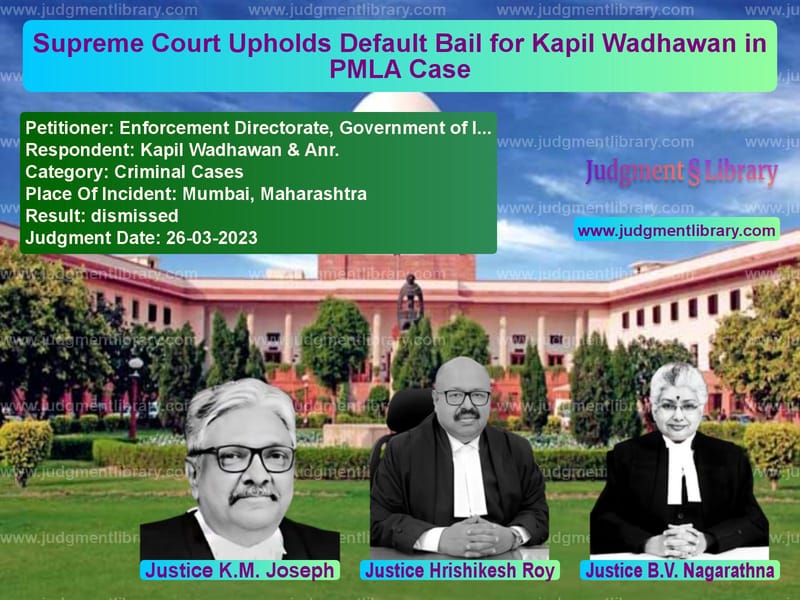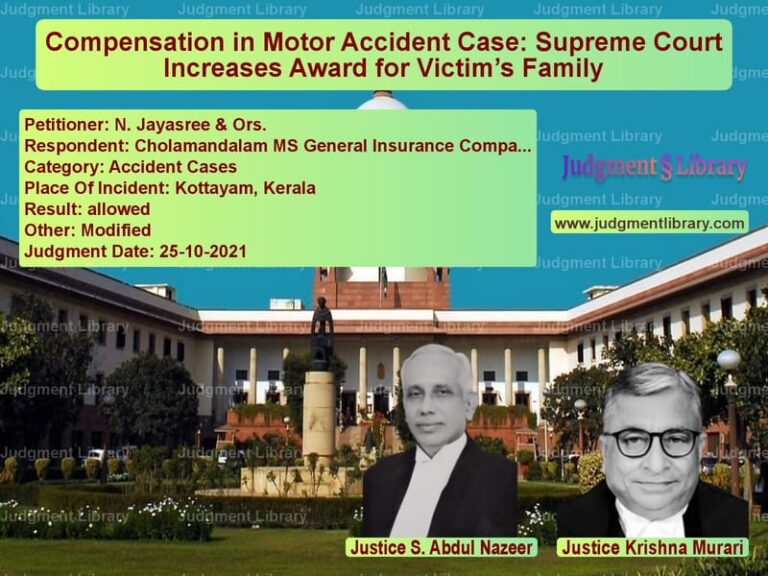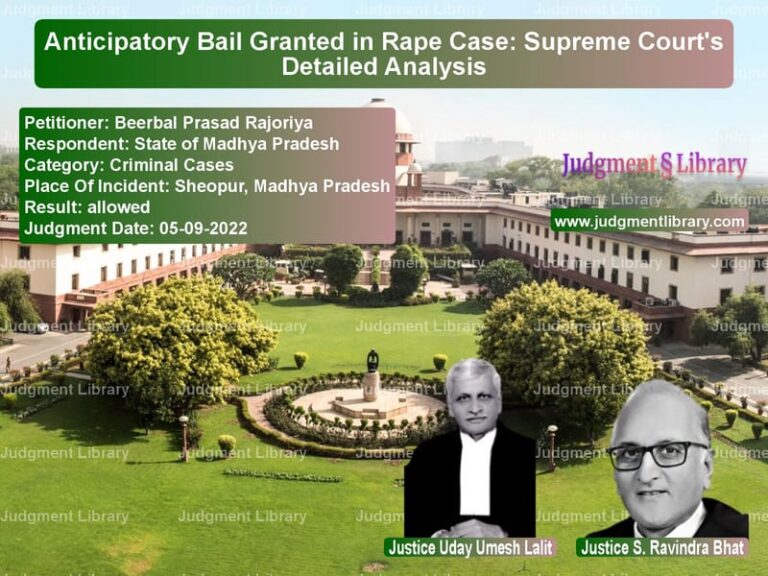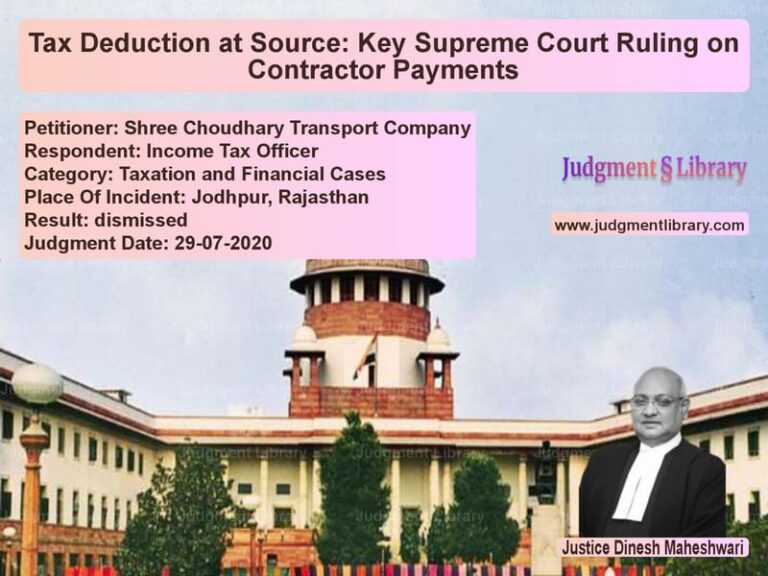Supreme Court Upholds Default Bail for Kapil Wadhawan in PMLA Case
The Supreme Court of India recently delivered a landmark judgment in Enforcement Directorate v. Kapil Wadhawan & Anr., reaffirming the importance of personal liberty and the right to default bail under Section 167(2) of the Code of Criminal Procedure (CrPC). The Court held that when calculating the period for default bail, the first day of remand must be included, thereby strengthening safeguards against prolonged detention.
Background of the Case
The case stemmed from the arrest of Kapil Wadhawan on May 14, 2020, in connection with a money laundering investigation by the Enforcement Directorate (ED). The accused was remanded to judicial custody the same day. The central question in the case was whether the 60-day period for default bail included the date of remand.
The ED claimed to have filed the complaint through e-mail on July 11, 2020 (Saturday), and submitted a physical copy in court on July 13, 2020 (Monday). Meanwhile, the accused applied for default bail at 8:53 AM on July 13, 2020, before the physical copy of the chargesheet was officially filed at 11:00 AM.
Legal Issue Before the Court
The core issue before the Supreme Court was:
- Whether the first day of remand should be included or excluded while calculating the 60-day period for default bail under Section 167(2) of CrPC.
Arguments of the Parties
Petitioner’s Arguments (Enforcement Directorate)
- The prosecution argued that the 60-day period should start from the day after the remand order, meaning the chargesheet was filed on time.
- The ED cited previous rulings such as State of M.P. v. Rustam and M. Ravindran v. Intelligence Officer, which held that the date of remand should be excluded in calculating the period for default bail.
- It was further argued that, even if the period ended on a Sunday, the chargesheet filed on the next working day (Monday) should be considered valid under the General Clauses Act.
Respondent’s Arguments (Kapil Wadhawan & Co-Accused)
- The accused contended that the 60-day period should start from the date of remand, making the last day of custody July 12, 2020 (Sunday).
- The Supreme Court’s ruling in Chaganti Satyanarayana v. State of Andhra Pradesh was cited to argue that the remand period begins on the date of first judicial custody.
- The delay in filing the chargesheet beyond 60 days gave the accused an indefeasible right to default bail, which could not be nullified by subsequent filings.
Key Observations of the Supreme Court
The Supreme Court, while ruling in favor of the accused, made the following crucial observations:
- Inclusion of the Date of Remand: The Court held that the first day of remand must be counted as part of the 60-day period, aligning with its ruling in Chaganti Satyanarayana.
- Indefeasible Right to Bail: The Court reiterated that once the period for filing a chargesheet expires, the accused must be granted default bail, irrespective of subsequent filings.
- Fundamental Right to Liberty: Emphasizing the significance of personal liberty, the Court stated that the prosecution’s failure to file a chargesheet within the statutory period could not be overlooked.
- Overruling Precedents: The Court found that Rustam and M. Ravindran had erroneously excluded the first day of remand and, therefore, were not binding.
Final Ruling
The Supreme Court upheld the Bombay High Court’s decision granting default bail to the accused. The key conclusions were:
- The 60-day period for default bail includes the date of remand.
- The chargesheet was filed on the 61st day, making the accused eligible for default bail.
- The accused had filed for default bail before the chargesheet was submitted, affirming their right to bail.
Accordingly, the Supreme Court dismissed the appeal by the Enforcement Directorate and directed the accused to be released.
Implications of the Judgment
The ruling has significant implications for criminal jurisprudence:
- Strengthens the Right to Bail: The judgment reinforces the importance of procedural safeguards in preventing prolonged detention.
- Ensures Timely Investigations: Law enforcement agencies must complete investigations within the statutory period to avoid default bail.
- Clarifies Judicial Precedents: The Supreme Court settled conflicting judgments, ensuring uniformity in computing remand periods.
- Balances State Interests with Personal Liberty: While ensuring fair trials, the judgment prevents arbitrary detention beyond statutory limits.
Conclusion
The Supreme Court’s decision in Enforcement Directorate v. Kapil Wadhawan is a landmark ruling upholding the principle that personal liberty cannot be compromised by procedural ambiguities. By including the first day of remand in the 60-day period, the Court has reinforced safeguards against unjustified detention. This ruling serves as an important precedent in ensuring fair treatment for the accused while maintaining the integrity of criminal investigations.
Petitioner Name: Enforcement Directorate, Government of India.Respondent Name: Kapil Wadhawan & Anr..Judgment By: Justice K.M. Joseph, Justice Hrishikesh Roy, Justice B.V. Nagarathna.Place Of Incident: Mumbai, Maharashtra.Judgment Date: 26-03-2023.
Don’t miss out on the full details! Download the complete judgment in PDF format below and gain valuable insights instantly!
Download Judgment: enforcement-director-vs-kapil-wadhawan-&-anr-supreme-court-of-india-judgment-dated-26-03-2023.pdf
Directly Download Judgment: Directly download this Judgment
See all petitions in Bail and Anticipatory Bail
See all petitions in Money Laundering Cases
See all petitions in Fraud and Forgery
See all petitions in Judgment by K.M. Joseph
See all petitions in Judgment by Hrishikesh Roy
See all petitions in Judgment by B.V. Nagarathna
See all petitions in dismissed
See all petitions in supreme court of India judgments March 2023
See all petitions in 2023 judgments
See all posts in Criminal Cases Category
See all allowed petitions in Criminal Cases Category
See all Dismissed petitions in Criminal Cases Category
See all partially allowed petitions in Criminal Cases Category







